Rutherford scattering - Study guides, Class notes & Summaries
Looking for the best study guides, study notes and summaries about Rutherford scattering? On this page you'll find 40 study documents about Rutherford scattering.
All 40 results
Sort by
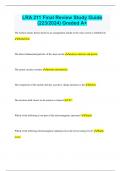 Popular
Popular
-
LRA 211 Final Review Study Guide (223/2024) Graded A+
- Exam (elaborations) • 9 pages • 2023
- Available in package deal
-
- $9.99
- 1x sold
- + learn more
LRA 211 Final Review Study Guide (223/2024) Graded A+ The earliest atomic theory based on an arrangement similar to the solar system is attributed to Rutherford. The three fundamental particles of the atom are the neutron, electron, and proton. The atomic nucleus contains protons and neutrons. The component of the nucleus that has a positive charge and mass is the proton. The electron shell closest to the nucleus is lettered "K". Which of the following is not part of the electromagnetic sp...
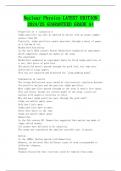
-
Nuclear Physics LATEST EDITION 2024/25 GUARANTEED GRADE A+
- Exam (elaborations) • 14 pages • 2024
-
- $10.99
- + learn more
Nuclear Physics LATEST EDITION 2024/25 GUARANTEED GRADE A+ Properties of α radiation 2 Alpha particles can only be emitted by nuclei with an atomic number greater than 82. Typically, alpha particles cannot penetrate through a sheet of paper or a few mm of air. Rutherford Scattering In the early 20th century Ernest Rutherford conducted an experiment which completely changed our model of the atom. The experiment Rutherford conducted an experiment where he fired alpha particles at a very th...
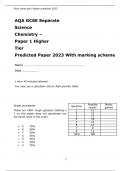
-
AQA GCSE Separate Science Chemistry – Paper 1 Higher Tier Predicted Paper 2023 With marking scheme
- Exam (elaborations) • 28 pages • 2023
-
- $24.29
- 1x sold
- + learn more
AQA GCSE Separate Science Chemistry – Paper 1 Higher Tier Predicted Paper 2023 With marking scheme Name …………………………………………………………………… Date ………………… 1 hour 45 minutes allowed. You may use a calculator and an AQA periodic table. Grade boundaries These are VERY rough guesses! Getting a 7 on this paper does not guarantee you the same mark in the exam. • 9 70% • 8 60% • 7 50% • 6 45% • 5 35% ...
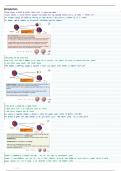
-
In-Depth Notes AQA A Level Physics (7408) : Nuclear Physics
- Summary • 27 pages • 2023
-
- $13.60
- 2x sold
- + learn more
Explore the fascinating world of nuclear physics with these comprehensive AQA Physics A-Level notes. Designed to provide a deep understanding of nuclear phenomena and their implications, this document delves into a wide range of topics critical for your A-level exam preparation. Topics Covered: Rutherford Scattering: Discover how Rutherford's pioneering experiment unveiled the structure of the atomic nucleus through the scattering of alpha particles. Closest Approach: Understand the co...
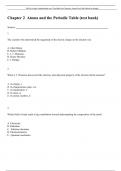
-
Test Bank for Chemistry Atoms First 2nd Edition by Burdge latest complete A+ graded
- Exam (elaborations) • 72 pages • 2023
-
- $16.09
- + learn more
Test Bank for Chemistry Atoms First 2nd Edition by Burdge latest complete A+ graded Chapter 2 Atoms and the Periodic Table (test bank) Student: 1. The scientist who determined the magnitude of the electric charge on the electron was A. John Dalton B. Robert Millikan C. J. J. Thomson D. Henry Moseley E. J. Burdge 2. When J. J. Thomson discovered the electron, what physical property of the electron did he measure? A. its charge, e B. its chargetomass ...
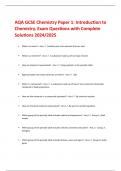
-
AQA GCSE Chemistry Paper 1: Introduction to Chemistry. Exam Questions with Complete Solutions 2024/2025
- Exam (elaborations) • 32 pages • 2024
- Available in package deal
-
- $12.49
- + learn more
What is an atom? - Ans .Smallest part of an element that can exist ▪ What is an element? - Ans .A substance made up of one type of atom ▪ How are elements represented? - Ans .Using symbols, in the periodic table ▪ Approximately how many elements are there? - Ans .100 ▪ What is a compound? - Ans .A substance made up of two or more elements chemically combined in fixed proportions ▪ How are the elements in a compound separated? - Ans .By chemical reaction ▪ How are chemical rea...
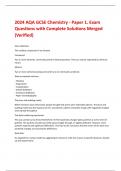
-
2024 AQA GCSE Chemistry - Paper 1. Exam Questions with Complete Solutions Merged (Verified)
- Exam (elaborations) • 26 pages • 2024
-
- $11.49
- + learn more
Atom definition The smallest component of an element Compound Two or more elements, chemically joined in fixed proportions. They can only be separated by chemical means. Mixture Two or more elements/compounds which are not chemically combined. Ways to separate mixtures - Filtration - Evaporation - Crystallisation - Simple distillation - Fractional distillation - Paper chromatography The plum and pudding model Before electrons were discovered, people thought that atoms were indivi...
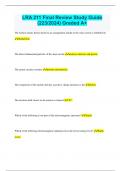
-
LRA 211 Final Review Study Guide (223/2024) Graded A+
- Exam (elaborations) • 9 pages • 2023
- Available in package deal
-
- $9.99
- + learn more
LRA 211 Final Review Study Guide (223/2024) Graded A+ The earliest atomic theory based on an arrangement similar to the solar system is attributed to Rutherford. The three fundamental particles of the atom are the neutron, electron, and proton. The atomic nucleus contains protons and neutrons. The component of the nucleus that has a positive charge and mass is the proton. The electron shell closest to the nucleus is lettered "K". Which of the following is not part of the electromagnetic ...
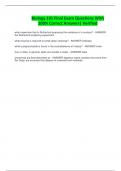
-
Biology 191 Final Exam Questions With 100% Correct Answers| Verified
- Exam (elaborations) • 15 pages • 2024
-
- $12.99
- + learn more
what experiment led to Rutherford proposing the existence of a nucleus? - ANSWER the Rutherford scattering experiment what enzyme is required to break down cellulose? - ANSWER cellulase which polysaccharide is found in the outerskeletons of insects? - ANSWER chitin true or false; in general, lipids are soluble in water - ANSWER false lysosomes are best described as - ANSWER digestive waste vesicles that come from the Golgi, are enzymes that dispose of unwanted cell materials.
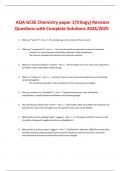
-
AQA GCSE Chemistry paper 1(Trilogy) Revision Questions with Complete Solutions 2024/2025
- Exam (elaborations) • 12 pages • 2024
- Available in package deal
-
- $9.49
- + learn more
1. What are *atoms*? - Ans .The smallest part of an element that can exist 2. What are *compounds*? - Ans .- They are formed from elements by chemical reactions - Contain 2 or more elements chemically combined in fixed proportions - Can only be separated into elements by chemical reactions 3. What do *chemical reactions* involve? - Ans .The formation of one or more new substances, and often involve detectable energy change 4. What is a *mixture*? - Ans .- Consists of two or more elements/...

How did he do that? By selling his study resources on Stuvia. Try it yourself! Discover all about earning on Stuvia


